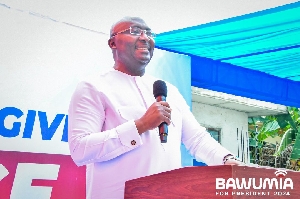Ghana sets an example
Teetering on the verge of success, but with failure always threatening to knock at the door, Ghana has lately taken up the mantle of what passes for a success story in Africa. It is the new darling in the halls where donors like the World Bank, the International Monetary Fund, the United States and Britain talk about making sure foreign aid does not end up in the hands of corrupt regimes.
What they have in mind are people like Kofi Asare, who labors mightily on his modest farm high in the hills near his village SamSam, carrying his ripe yellow pineapples on his head to get them from the fields to his truck. Dripping with sweat, Asare, 28, is the very picture of Africa's getting its act together. Last year, he made $10,000, enough to make the transition from mud hut to cement house. This year, with an eye warily on the future, he has planted 2,500 of a new "low acid" pineapple pioneered by the Del Monte Foods Co. that threatens to smoke the Ghana "smooth cayenne" variety out of Europe's supermarkets.
But Ghana is a good kid in a really bad neighborhood. Its West African neighbors, from Liberia to Sierra Leone to Ivory Coast, have bred so much fighting in the last 10 years that they make Ghana seem like Iowa. Ghana does not have insurgents running around its hinterlands dressed in wedding gowns and wigs (like Liberia and Sierra Leone) or 8-year-old rebel soldiers toting machine guns (Liberia, Sierra Leone, Ivory Coast).
It has had four successful elections since 1993, and has actually experienced a peaceful transfer of power between democratically elected governments, another rarity in the neighborhood. Indeed, it is becoming a haven for refugees who come not only from Ghana's unruly neighbors to the west, but also from other conflict zones in Africa. Last week, a group of refugees from Darfur, Sudan, showed up. It remains unclear how they made it across the continent, crossing the Togolese border from five countries away, but the government in Accra, the capital, is busy making plans to settle them.
Ghanaians like to brag that they have passed the point of no return in making their humid patch of West Africa a functioning democracy with all the perks that brings: a free and vibrant press, steady though slow economic growth, tourism. There is even a shopping mall with a multiplex cinema going up in Accra. With such obvious payoffs for adopting good governance, many Ghanaians say it is inconceivable that the country will turn back to the failed-state practices that have taken so many other African countries down the drain. "If anyone tried anything like a coup here, this place would immediately become ungovernable," says Kweku Sakyi Addo, the host of one of Ghana's innumerable political talk shows. "We've seen what happens in other African countries. There is no way people will put up with that here."
But for all the talk of what a model African country Ghana is, it is still, literally, dirt poor, which demonstrates just how removed Africa is from the proverbial rising tide of the global economy that is supposed to be lifting all boats. Ghana has a per capita income of $421 a year; most people survive here on $300 to $400. Ten-year-old girls still run barefoot up to stopped cars in the sweltering midday heat trying to sell anything they think will bring in money - from oranges to cell phone batteries to toilet paper. Street children still sleep on the median separating highway lanes.
While the Ghanaian government appears to have a clear idea of exactly what steps it must take to try to alleviate the huge divide between Accra's growing middle class and the country's rural poor, some goals are already slipping. Child mortality rates, already high, increased in 2004; nobody seems to know why. A huge gender gap remains in primary-school education: Far more boys make it to school than girls.
Almost half of Ghana's national budget comes from foreign aid; Britain is its largest single-country donor. But the size of the country's budget, a scant $3 billion, supporting 20 million people, is testament to just how far Ghana still has to go, and just how much more it still needs to climb out of poverty. A proposal by Prime Minister Tony Blair of Britain for rich countries to increase their aid drastically to Africa in a Marshall Plan approach would be a huge step toward helping to bring the continent back into the folds of the rest of the world.
Ghana shows what a tough road this is going to be. But it also shows that bringing Africa back is eminently doable.










